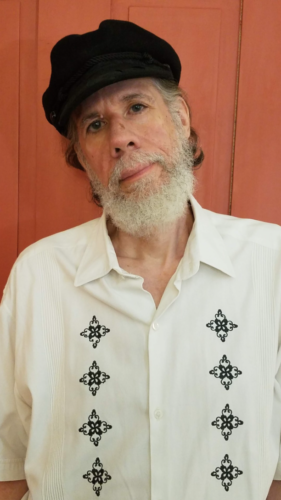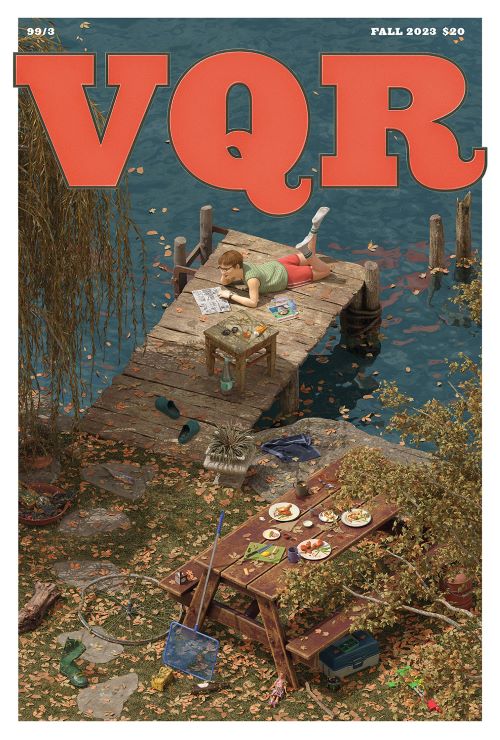The iguanas slither from the branches of trees splintered by the hurricanes.The iguanas crawl from the cracks in the ground split by the earthquakes.The iguanas rise from brown floodwaters that carry bridges to their doom.The iguanas multiply through the night of blackouts in hospitals and morgues.The iguanas burrow beneath roads to bury their eggs in the lungs of cities.The iguanas slap their clawed feet as they churn the earth of the farmer’s field.Iguanas rip the rough skin of mango; iguanas rip banana; iguanas rip papaya.The iguanas skitter through the cemetery by the sea, tails snapping whenthey disappear between the crosses, sunning themselves on the walls,hiding in the crevices of crypts where families still cling to each otherbeneath the weathered stone. The iguanas stare stupefied at the bustof a mustachioed poet who died after the bacteria feasted on his heart.The iguanas know nothing of José de Diego, his songs of the guaraguaoand the pitirre, the hawk fleeing from the two-ounce kingbird, the slashof claws to save her young still blind in the nest. The poet’s hawk is longand dark with imperial wings, the poet’s kingbird an arrow through the neck.An iguana warms his belly on the flat stone that says Pedro Albizu Campos.The iguanas know nothing of Albizu: the lawyer and the canecutters’ strike,the crowd listening in the rain, cane stalks in their heads igniting like torches.The iguanas learn nothing from El Maestro, his staccato tongue on the radiosplitting the ground under the boots of the military governor, collapsingthe courthouses and flagpole of empire. The iguanas keep vigil at the tomb,burial stone white as the stone of seditious conspiracy that buried him, stone faceof thirty years’ incarceration, subversive tongue gone to stone after the stroke.The iguanas forget the thousands in black sweeping his coffin to the edge of the sea.The green of the iguanas in the cemetery is the green of soldiers in uniform.The green of the iguanas in the cemetery is the green of felt at the casinos.The green of the iguanas in the cemetery is the green of cash on cruise ships.The green of the iguanas in the cemetery is the green stacked in steel vaults.The green of the iguanas in the cemetery is the green of lawn after lawn hiddenby gates, the green of mangoes in a bowl on the table of the absentee landlords.In the movies on the drive-in screens and Saturday matinees of the Cold War,iguanas played the dinosaurs, horns glued to their snouts, frills pasted to theirheads, thrashing in close-up struggle with other iguanas over The Lost World.The dead eyes of the iguanas, keeping vigil over the city of the dead, will neversee the asteroid of their extinction, the earth melting to suck their bones intowhirlpools of mud, the wave sweeping them to sea, the flight of the poet’s kingbird.
The Iguanas Skitter Through the Cemetery by the Sea
Viejo San Juan, Puerto Rico
Feature Date
- December 23, 2023
Series
Selected By
Share This Poem
Print This Poem
Copyright © 2023 by Martín Espada.
All rights reserved.
Reproduced by Poetry Daily with permission.

Martín Espada has published more than twenty books as a poet, editor, essayist and translator. His latest book of poems is called Floaters, winner of the 2021 National Book Award and a Massachusetts Book Award, and a finalist for the Los Angeles Times Book Prize. Other books of poems include Vivas to Those Who Have Failed (2016), The Trouble Ball (2011), The Republic of Poetry (2006), Alabanza (2003) and Imagine the Angels of Bread (1996). He is the editor of What Saves Us: Poems of Empathy and Outrage in the Age of Trump (2019). He has received the Ruth Lilly Poetry Prize, the Shelley Memorial Award, the Robert Creeley Award, an Academy of American Poets Fellowship, the PEN/Revson Fellowship, a Letras Boricuas Fellowship and a Guggenheim Fellowship. The Republic of Poetry was a finalist for the Pulitzer Prize. The title poem of his collection Alabanza, about 9/11, has been widely anthologized and performed. His book of essays and poems, Zapata’s Disciple (1998), was banned in Tucson as part of the Mexican-American Studies Program outlawed by the state of Arizona. A former tenant lawyer in Greater Boston, Espada is a professor of English at the University of Massachusetts Amherst. http://www.martinespada.net/

Fall 2023
Charlottesville, Virginia
University of Virginia
Editor
Paul Reyes
Publisher & Executive Editor
Allison Wright
Poetry Editor
Gregory Pardlo
From its inception in prohibition, through depression and war, in prosperity and peace, the Virginia Quarterly Review has been a haven—and home—for the best essayists, fiction writers, and poets, seeking contributors from every section of the United States and abroad. It has not limited itself to any special field. No topic has been alien: literary, public affairs, the arts, history, the economy. If it could be approached through essay or discussion, poetry or prose, VQR has covered it.
Poetry Daily Depends on You
With your support, we make reading the best contemporary poetry a treasured daily experience. Consider a contribution today.



